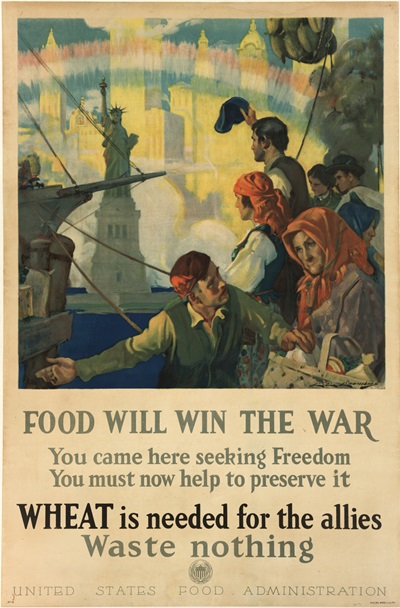|
|
|
Why did America enter the war?On 2 April 1917 US President Woodrow Wilson explained why he wanted Congress to declare war on Germany: Source AOn the third of February... I officially laid before you the extraordinary announcement of the Imperial German Government that after the first day of February it was its purpose to put aside all restraints of law and humanity and use its submarines to sink every vessel that sought to approach [any Allied port]... American ships have been sunk, American lives taken.... Our motive will not be revenge, but only the vindication of right, of human right…. With a profound sense of the solemn and even tragical character of the step I am taking ... I advise that [the U.S.] formally accept the status of belligerent that has thus been thrust upon it.... One of the things that has served to convince us that the Prussian autocracy was not and could never be our friends is that from the very outset of the present war it has filled our unsuspecting communities and even our offices of government with spies and set criminal intrigues everywhere against our national unity.... That it means to stir up enemies against us at our very doors the intercepted note to the German Minister in Mexico City [i.e. the Zimmermann telegram] is eloquent evidence. In such a government... there can be no assured security for the democratic governments of the world and we are glad ... to fight thus for the ultimate peace of the world and for the liberation of its peoples. The world must be made safe for democracy.... We shall fight for the things which we have always carried nearest to our hearts for democracy, for the right [of people] to have a voice in their own governments, for the rights and liberties of small nations, for a universal dominion of right by such a concert of free peoples as shall bring peace and safety to all nations and make the world itself at last free. To such a task we can dedicate our lives and our fortunes, everything that we are and everything that we have. Extract from Woodrow Wilson, an Speech to Congress (2 April 1917)
There were additional reasons for America to go to war which Wilson did not mention:
|
Going DeeperThe following links will help you widen your knowledge: Basic account from BBC News
YouTube The USWW100 short videos are a must-watch: Unrestricted Submarine Warfare
Source BThe Zimmermann Telegram We intend to begin on the first of February unrestricted submarine warfare. We shall endeavor in spite of this to keep the United State of America neutral. In the event of this not succeeding, we make Mexico a proposal or alliance on the following basis: make war together, make peace together, generous financial support and an understanding on our part that Mexico is to reconquer the lost territory in Texas, New Mexico, and Arizona.... Signed, ZIMMERMANN” Coded message sent 16 January 1917. On 29 March, Zimmermann gave a speech to the German Reichstag confirming he sent the telegram,
Consider:Study Source A and pull out all the different reasons Wilson gives for accepting 'the status of belligerent' (declaring war). |
|
America enters the war – A TIMELINE May 1915: The British ocean liner Lusitania was sunk by a German submarine; 128 of the dead are American. May 1915: The Preparedness Movement launched its crusade for military readiness; in August, 1,200 volunteers attended its first military training camp. October 1915: American bankers loaned Britain and France $500 million to purchase war supplies; the largest private loan ever. March 1916: in response to pressure from President Wilson, Germany suspended unrestricted submarine warfare. April 1916: American volunteer pilots formed the Lafayette Escadrille in France. June 1916: Congress passed the National Defense Act authorizing an increase in the size of the US Army. July 1916: An explosion set by German saboteurs destroyed the Black Tom munitions depot in New Jersey, resulting in 3 dead and $30 million damage. February 1917: Germany resumed unrestricted submarine warfare. March 1917: White House released to the press the Zimmermann telegram, Germany's attempt to get Mexico to attack the US. April 1917: America declared war on Germany.
|
|
What did America contribute to the war effort? [ANSWER]
Consider:Was America a 'war-winning-weapon'?
|
|
|
|
|
|
Spotted an error on this page? Broken link? Anything missing? Let me know. |
|
